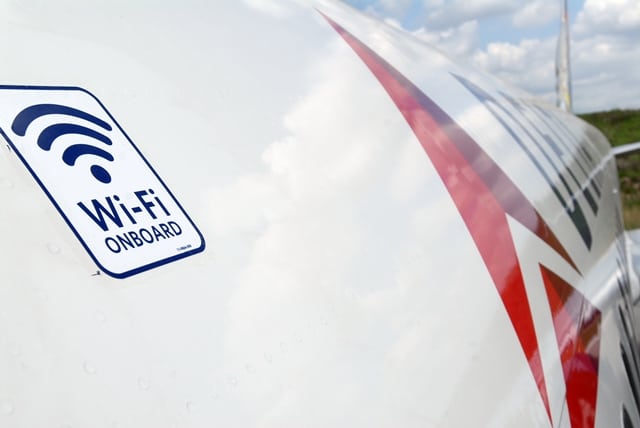[Avionics Today 03-06-2015] Gogo is gearing up for the United States Federal Communications Commission (FCC) to authorize the sale of Air-to-Ground (ATG) mobile broadband in the 14 – 14.5 Ghz range on a secondary license basis, an auction that could ultimately bring more than just spectrum to their business. Speaking at the Morgan Stanley Technology, Media and Telecom Conference Wednesday, Gogo’s CEO Michael Small admitted that the In-Flight Connectivity (IFC) provider’s latest decision to provide $340 million in convertible notes was directly related to the possibility of the upcoming FCC auction.
 |
| Gogo is seeking spectrum opportunities to enhance its ATG offering alongside Delta. Photo: Delta |
“The reason we did it now is there is the prospect of a 14 Ghz auction and, if that were to come along, we wanted to make sure we had the firepower to participate in that auction,” said Small. The auction was originally proposed by telecommunications product provider Qualcomm and would allow companies to purchase ATG licenses within the Ku band primarily used for satellite communications.
This would enable Gogo to deliver increased bandwidth to its ATG customers alongside its 2Ku satellite option, which is coming available within the year. But the auction draft order has been met with resistance from the Association of Flight Attendants-Communications Workers of America (AFA-CWA) who site concerns in cyber security. The FCC also needs to work out how many licenses will be made available, which could be anywhere between four 125 MHz-wide spectrum license —, as Gogo is currently requesting — and two 250 MHz-wide spectrum licenses. Qualcomm would like to see less and larger spectrum licenses come available, noting that smaller spectrum availability could inhibit bandwidth and, therefore, passenger connectivity.
The draft order is in front of the FCC and Gogo is in check to participate should it be approved, which the company feels confident could be any day now. “It is a rare event to have so much spectrum coming at once. There’s 500 MHz; the range is two to four licenses. It’s going to be two, three or four. Even if it’s four, 125 MHz is a massive amount of spectrum and will allow many orders of magnitude increase and reduction in loss per megabit, should the spectrum come available,” Small said.
Gogo is so keen to snatch up the spectrum because it believes the increased bandwidth will allow the company to begin offering the types of Internet and Wi-Fi speeds that passengers have come to know and expect on the ground, if not globally, then at least within the confines of the U.S.
“I do think the gap between what’s possible on the ground and what can happen in the sky will essentially disappear over the continental United States. Air-to-ground, if you get a lot of spectrum, is the winning solution, but it’s constrained to the landmass,” said Small.
Playing to this kind of connectivity opportunity over North America is Gogo’s recently announced deal with Delta Airlines. In the deal, the IFC provider will both install its satellite-based 2Ku offering on 250 aircraft flying long-haul and international routes as well as partner with the airline to explore and launch the “next generation air-to-ground technologies” for domestic, short-haul aircraft flying within the U.S.
While Gogo is still ambiguous about future plans and the exact terms of the new technologies the partners will work on to develop the ATG arena, the IFC provider notes that it’s more than a simple renovation to the existing ATG-4 network.
“It’s really not an upgrade of the existing network, it’s all new antennas — both on the ground and in the air — new electronics, new mobility management. We should share, in most cases, the towers, the physical structure and backhaul,” said Small, referencing the current network. “But it’s a totally new technology.”
The new network with Delta would likely piggyback on the 14 Ghz spectrum that Gogo seems fairly confident it will not only see come to auction, but also win. And if so, Gogo can continue its world domination reasonably untapped.
“Ultimately, to be customer-friendly you need to get more megabits for the dollar to the customer, and if they see that value equation improve they’re going to be happy,” said Small. “That’s why 2Ku is so powerful. That’s why we’re looking at the 14 Ghz auction. … That’s the guts of our business and that’s how we keep customers happy.”